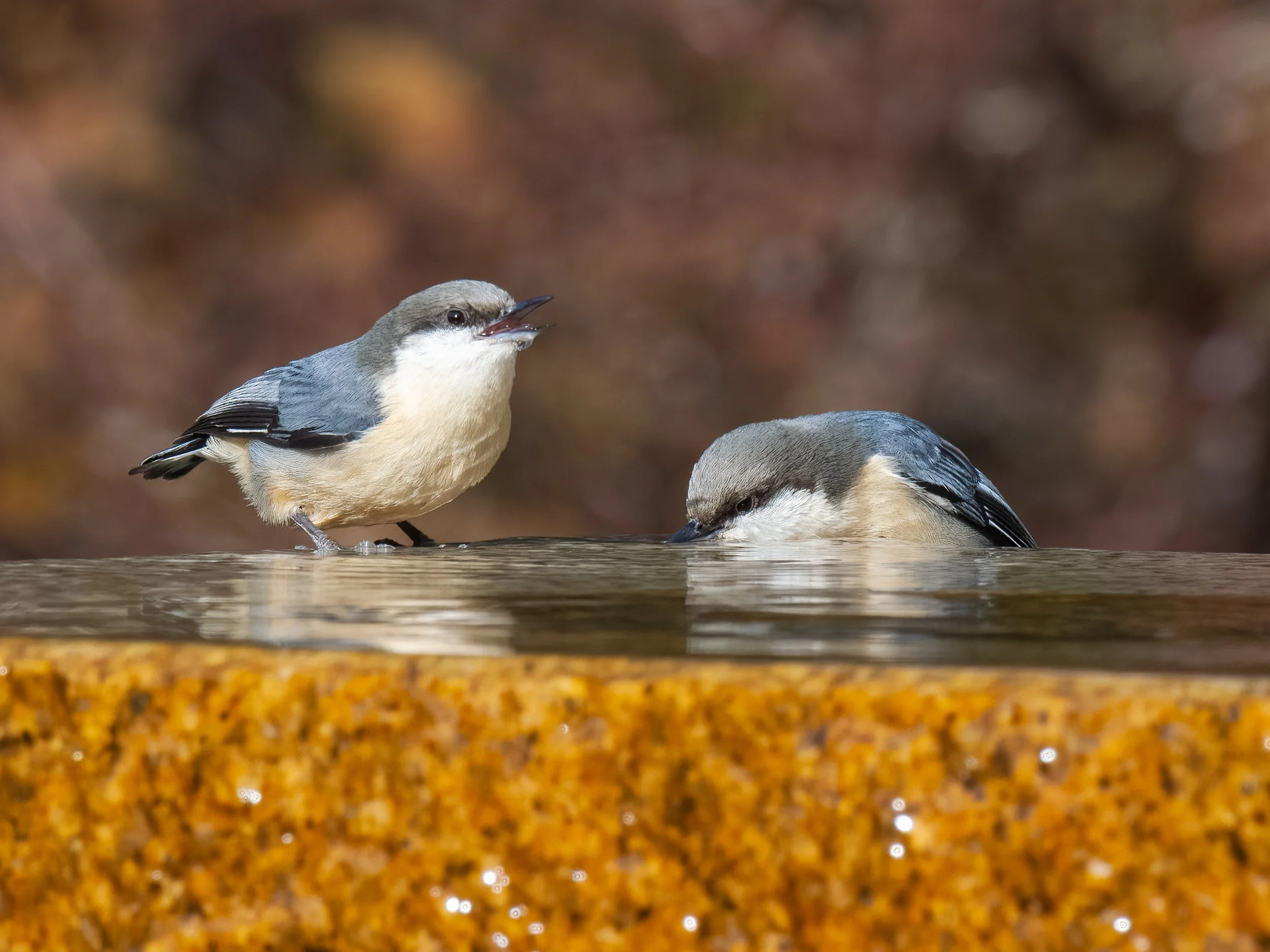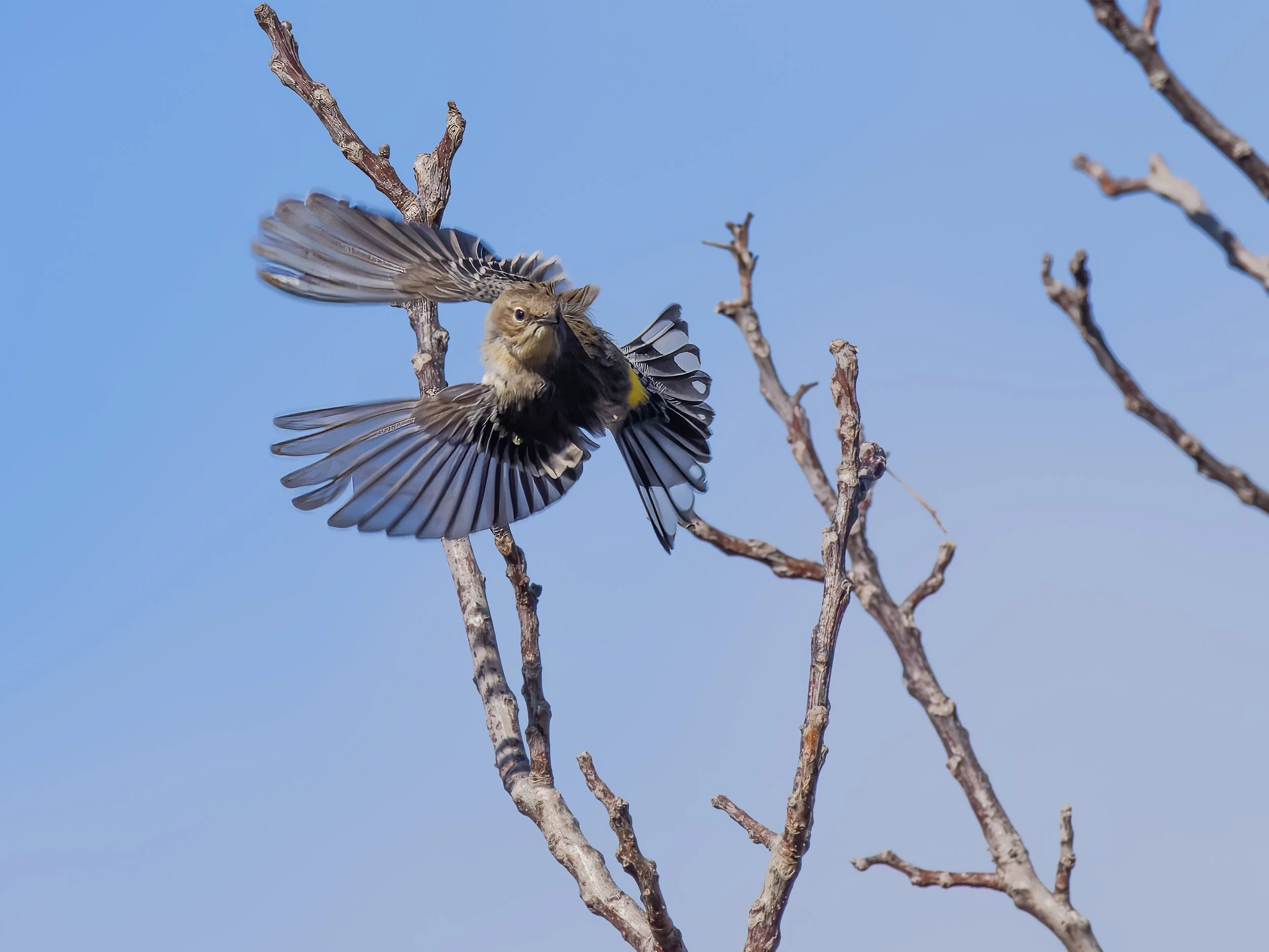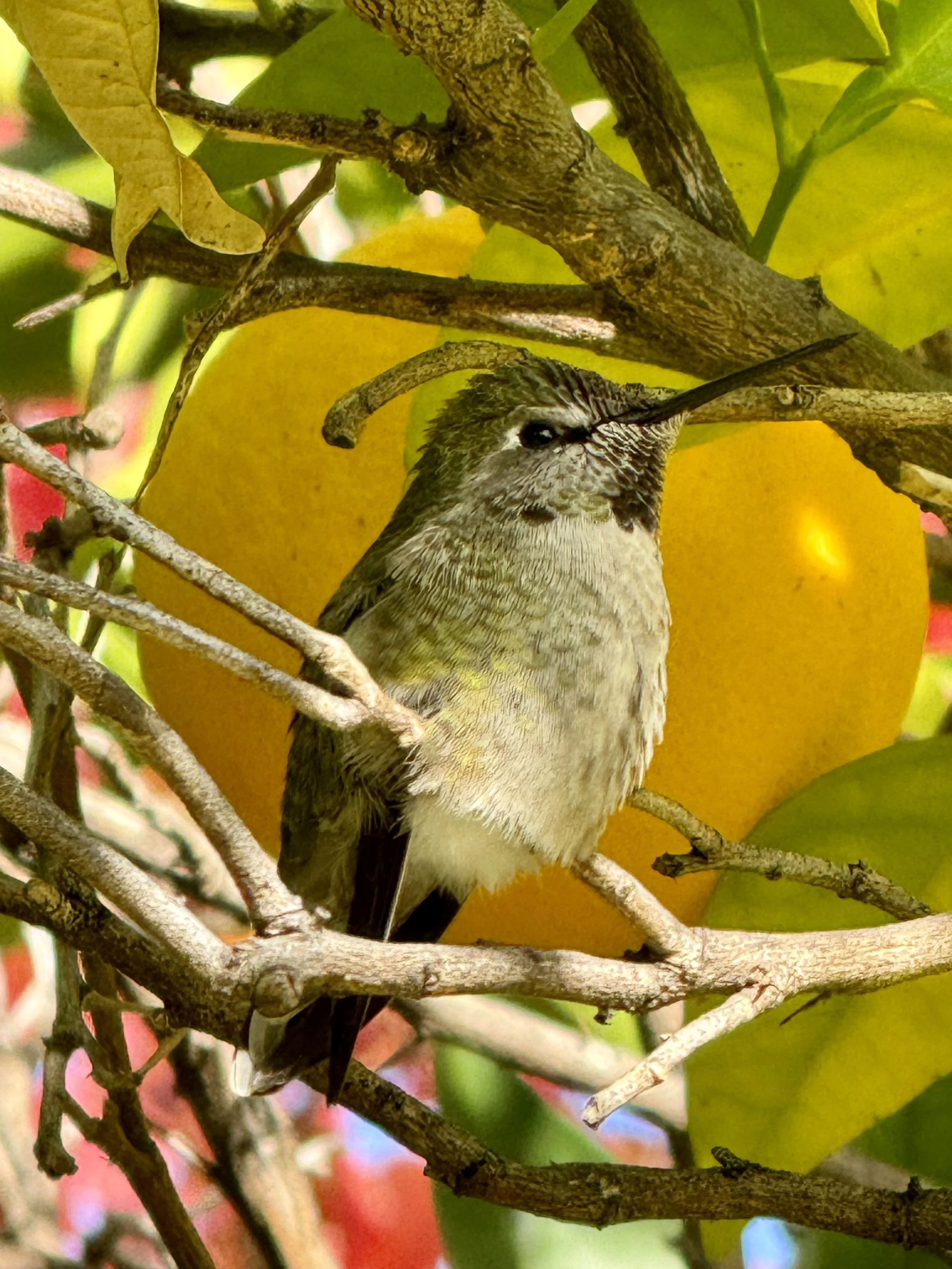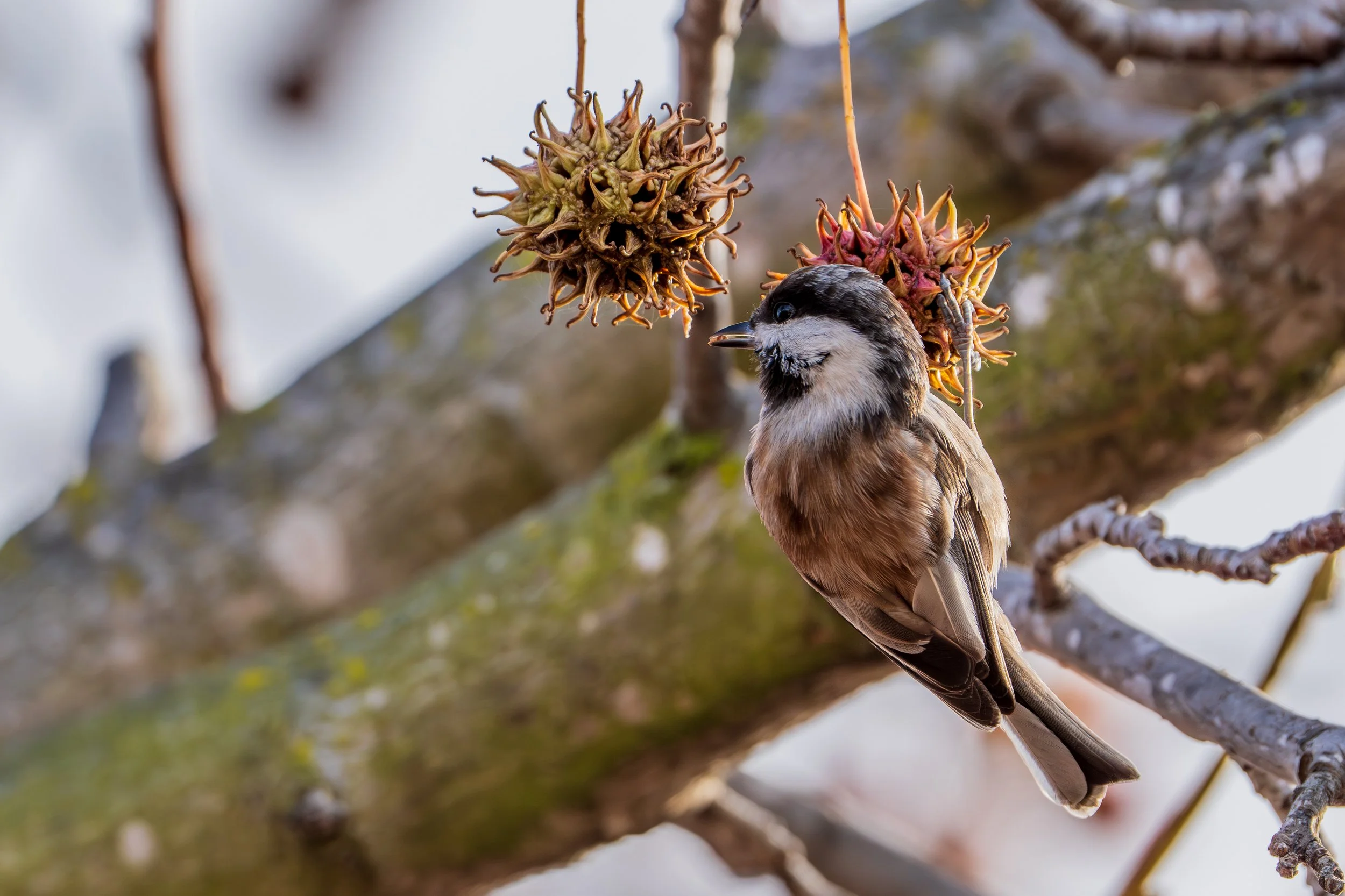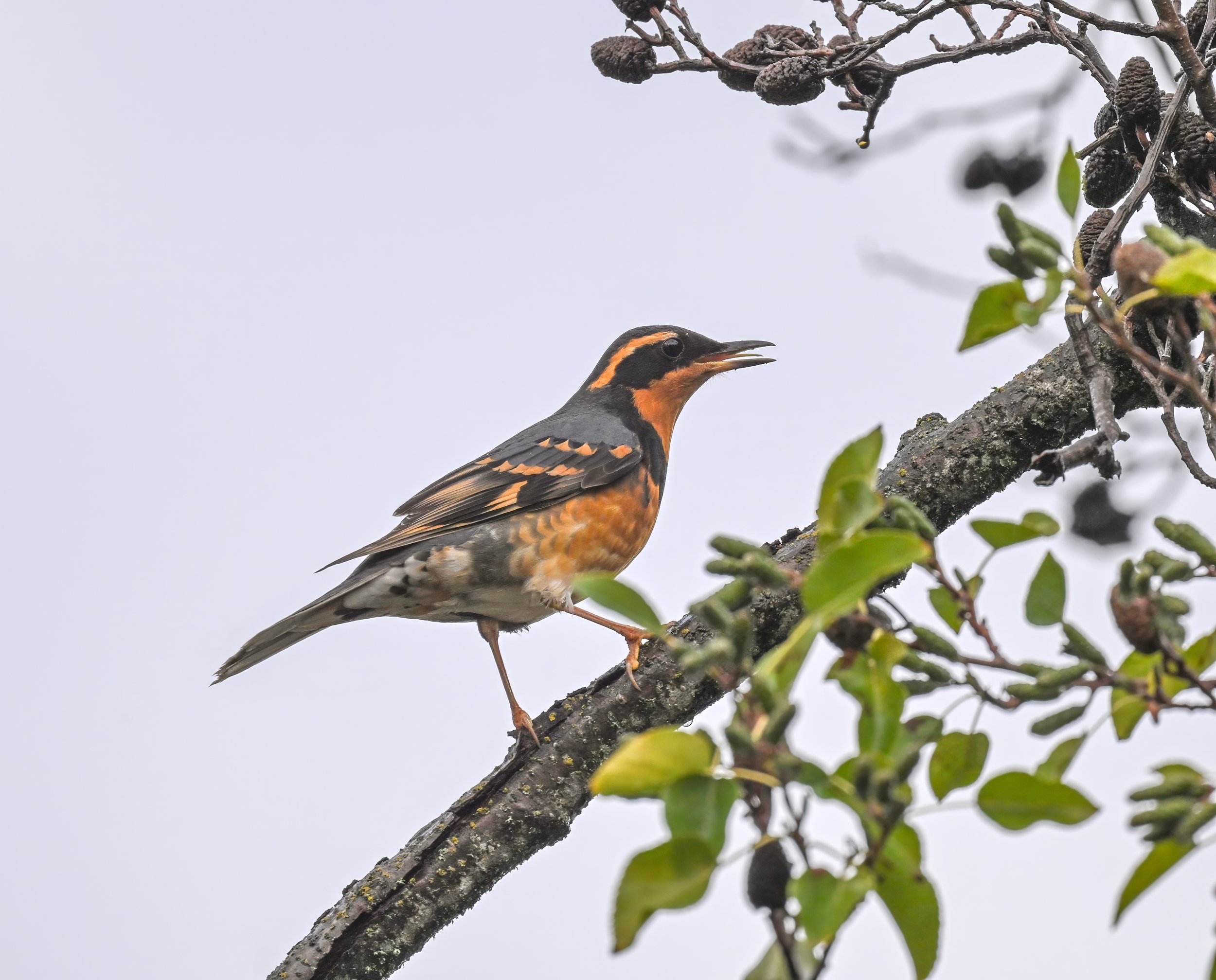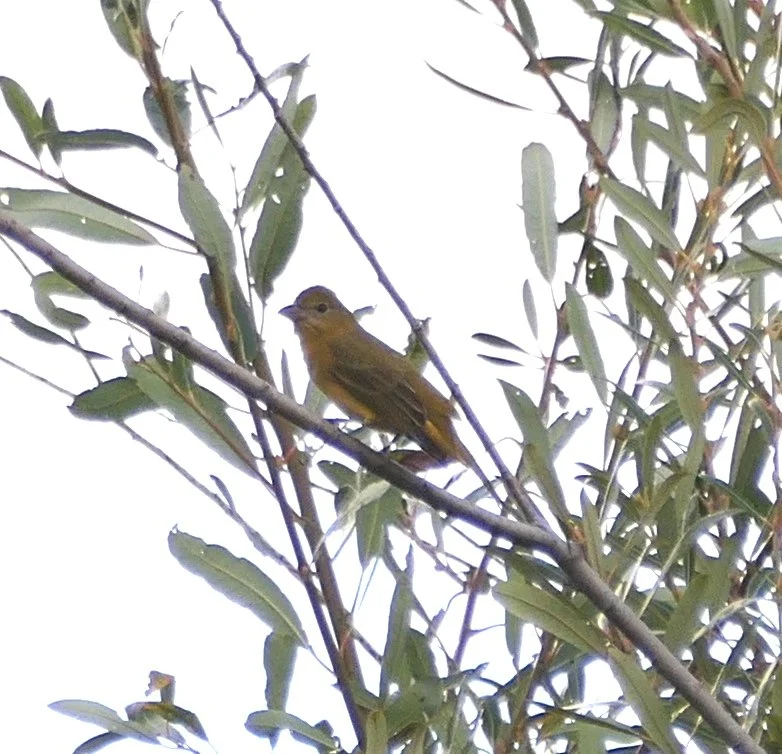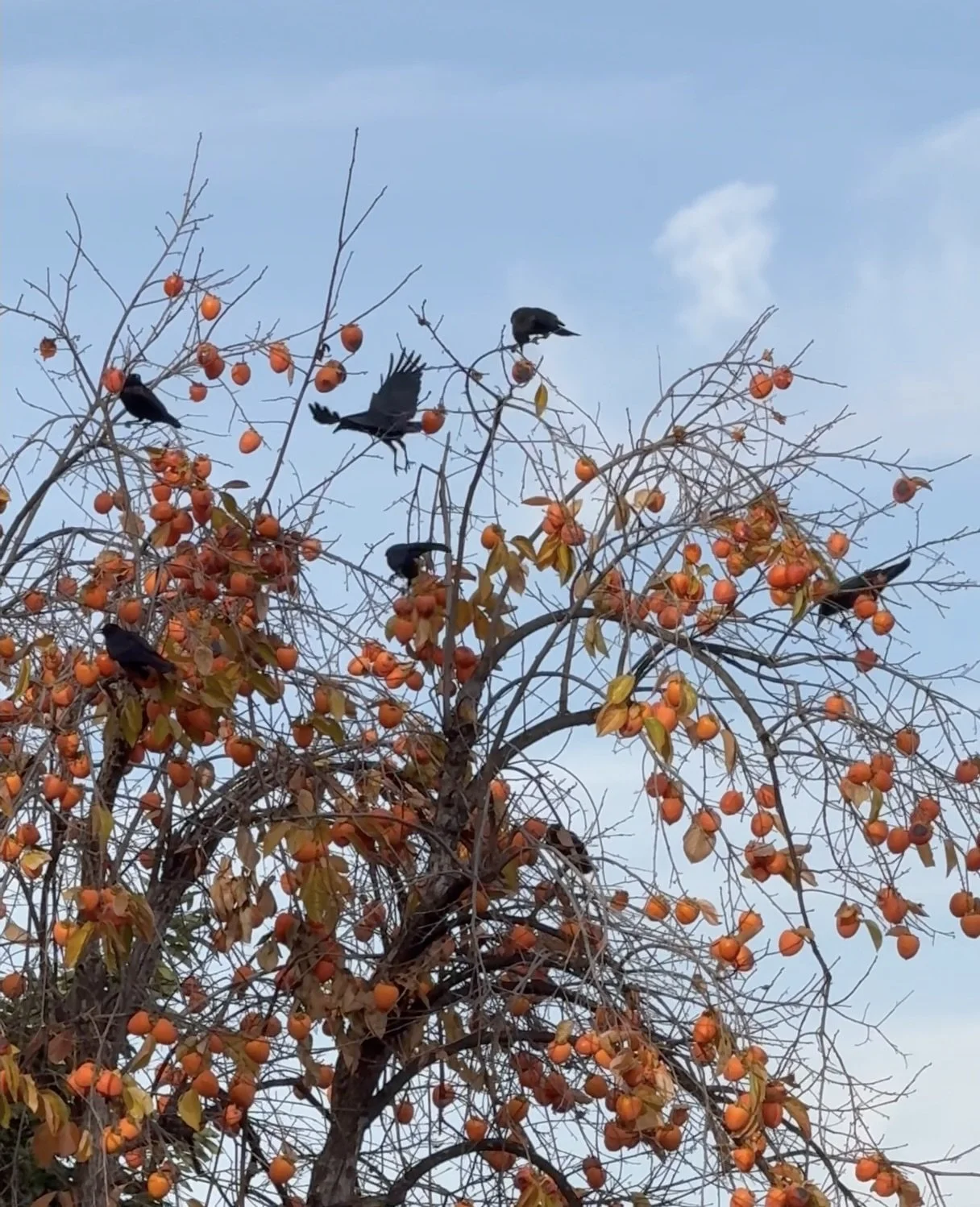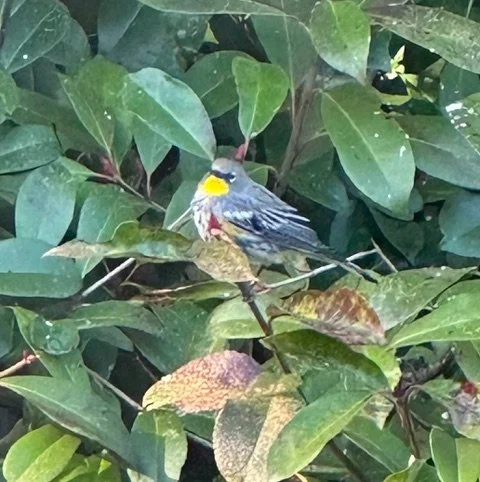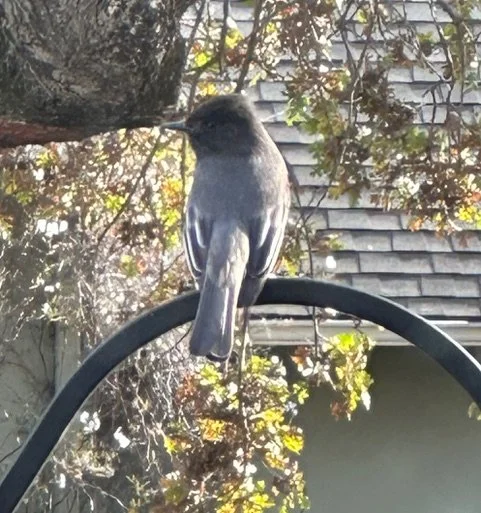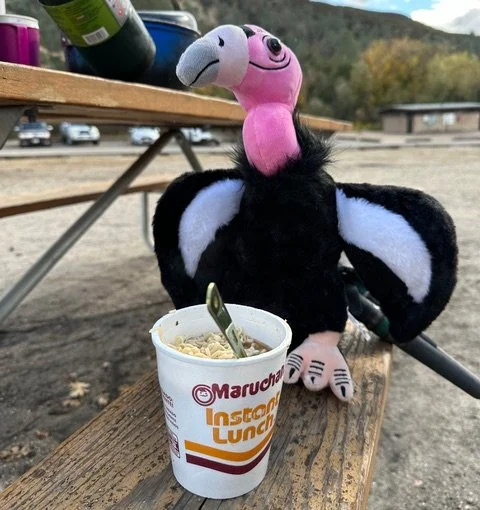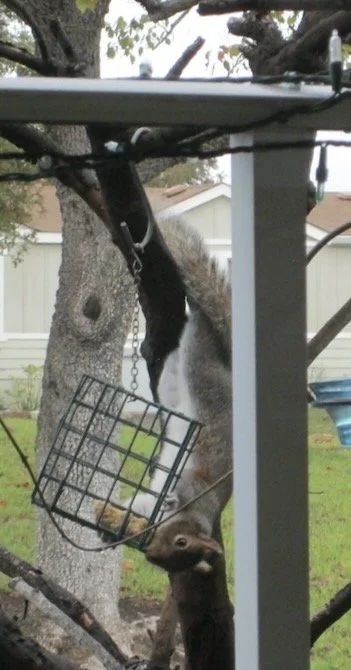Backyard Bird Observations from Our Members and Friends
Winter is here, and it’s rainy and green out there!
In November and December, you observed many of the birds that spend the cold season with us, like Cedar Waxwings, Hermit Thrushes, Pine Siskins, Hooded Mergansers, and even a Varied Thrush.
Birds were drawn into your neighborhoods by winter fruits and berries, and you spotted American Crows, American Robins, and Yellow-rumped Warblers feasting on the abundance. Water also attracted birds to your yards, including Acorn Woodpeckers, Northern Flickers, Steller’s Jays, and Pygmy Nuthatches.
Raptors seem to be more present, or at least more visible, in residential areas during the winter, and you spotted less-common neighborhood visitors like Merlins (these birds winter here) and White-tailed Kites.
Of course, your regular yard birds were also here, including Anna’s Hummingbirds, Black Phoebes, Chestnut-backed Chickadees, and Oak Titmice. And a regular yard mammal - the squirrel - was up to its usual antics!
A Red-breasted Nuthatch photographed by Molly Graham in her neighborhood this fall. This bright, colorful nuthatch makes loud honking calls, sounding like a much bigger bird!
This fall and winter, All Around Town has received more reports of Red-breasted Nuthatches than usual. eBird data show that these birds have been observed in more locations in Santa Clara County this winter than in recent winters. What might be happening?
SCVAS Executive Director Matthew Dodder offers two possible explanations. First, he says, we could be witnessing a minor irruption. It could also be that our local Red-breasted Nuthatches had a very successful nesting season, and that they and their offspring have moved further into residential neighborhoods this winter.
An irruption means that unusually high numbers of a bird species arrive from other parts and are present during a particular season. Among Red-breasted Nuthatches, irruptions occur when the birds’ winter food supply to the north - conifer cones - is poor, and they migrate further south than usual in search of food. Our local Red-breasteds breed in the Santa Cruz Mountains, and they may also come down to the Santa Clara Valley to forage during the colder months.
Regardless - look and listen for the vibrant, vocal Red-breasted Nuthatch this winter!
Three species are making their All Around Town debut in this edition:
Wilson’s Snipes were observed along a creek trail in Santa Clara. These shy shorebirds have long, straight bills; large, dark eyes; and rich black, brown, gray, and ruddy plumage, with stripes and spots. Snipes are often hidden in vegetation along banks of water - look for them in the reeds that border the bay or a creek.
Ring-billed Gulls were spotted flying over a residential neighborhood in Menlo Park. These birds are commonly found in our area, especially during the fall and winter, and have a black “ring” on their bill, just as their name says they do (the ring looks like a stripe on both the top and bottom parts of the bill, located towards the tip).
A Summer Tanager was spotted on another urban creek trail in November. Unlike the Western Tanager, which breeds here, the Summer Tanager is a very rare visitor to our county. The bird was far from both its summer and winter grounds, which are further south, and is likely a vagrant, a bird that has wandered off its usual course.
In 2023, we added 10 new species to our All Around Town collective bird list.
These ten birds are:
Hooded Merganser
American Coot
Wilson’s Snipe
Ring-billed Gull
Willow Flycatcher
Ash-throated Flycatcher
Cliff Swallow
Northern Waterthrush
Summer Tanager
Painted Bunting
Some of these birds are found here year-round; others are seasonal; and others migrate through, stopping here only briefly. They range from common to very rare finds in our county. A number of these birds were spotted at urban creeks and lakes, underscoring the importance of water for attracting birds.
The total number of bird species observed since the start of All Around Town is now 129 (the complete list is at the end of this article). For a project focused on birding near home, this is an impressive number, almost one third of all of the bird species that have ever been observed in Santa Clara County.
What new birds will you spot in 2024? We can’t wait to find out!
Here are your backyard and neighborhood bird observations from November and December 2023 and early January 2024. Enjoy!
Deanne Tucker (Los Altos) says: “This past year was great for backyard birding since we added a fantastic fountain during our landscape remodel. The birds love it and several species will bathe together.”
Pygmy Nuthatches, photographed by Deanne, are regular visitors to Deanne’s yard.
Deanne adds: “We had our first-ever Red-breasted Nuthatches along with our usual Pygmy Nuthatches and White-breasted Nuthatches.”
A Red-breasted Nuthatch visits Deanne’s yard.
A Yellow-rumped Warbler takes flight, photographed by Deanne. Note the yellow patch on the bird’s lower back, from which it gets its name!
In early December, Rick Blackmun (San Jose) wrote to us: “Every morning as a routine I open our front door a crack so my cat can look outside through the screen door. I noticed that she was making chattering noises like cats do when they see a bird. I looked to see what was interesting to her.”
“It was a Black Phoebe perched on a wire under our porch eave. It was right next to a porch light that I leave on all night for security reasons. The light attracts a lot of insects during the night. That’s one smart bird!”
An Anna’s Hummingbird, observed by Sapana, is tinier than a lemon!
Sapana Kapadia (San Jose) shared an observation from December:
“Watching this Anna’s Hummingbird perched on a lemon tree was a moment of delight. Every few minutes it would hover in the air then be back on the same branch of the lemon tree all puffed up. Hummingbirds are so cute and adorable. It was a calming experience for me.”
A Red-tailed Hawk inspects Molly’s feeder. Unsurprisingly, the songbirds have disappeared!
Molly Graham (Mountain View) writes: “We've seen a lot of raptors rotate through in the fall and winter, and were particularly surprised to see a Merlin. The end of December was the first time I saw a Red-tailed Hawk swoop down directly onto our fence and next to the feeder for a few seconds before gliding off as quickly as it descended.” Her feeder has also attracted a Cooper’s Hawk before.
Cedar Waxwings swarm a palm tree in Molly’s neighborhood, eating the fruit.
Molly continues: “The Cedar Waxwings have been whistling away nearby, and I hear them before seeing them if I see them at all. Something I noticed is that they favor the same individual trees that the orioles do when they're in the neighborhood: a particular ornamental palm, a lone sycamore, a tall evergreen tree, and a large flowering tree. Also similar to the orioles, they've been very shy and difficult to photograph. As soon as I go outside with my camera they disappear.”
A Hermit Thrush enjoys the water at Molly’s bird bath.
“I've been hearing a single American Robin in the same popular sycamore tree. There is a pair of Hermit Thrushes that I can often hear but almost never see, except for one instance in early January when both of them were just hanging out on our fence for a few minutes. I was also able to capture a clip of one of the thrushes bathing in December.”
A Pine Siskin, photographed by Molly. Pine Siskins are winter birds in the Santa Clara Valley. They are more often seen in residential neighborhoods during irruptive years, like the winter of 2020-21, when unusually large numbers of the birds arrived to spend the winter in our area.
Molly continues: “At first I remember seeing only one or two Pine Siskins at a time, then it became four who consistently came through, then recently after some rain I went outside and saw easily fifty on the driveway and in the surrounding trees (with some House Finches mixed in). The flocks of siskins and waxwings have created a lot of movement and interest in the winter months.”
“I'm not sure if I just couldn't see the woodpeckers as much before or if I can only see because the leaves have fallen, but any time I go out to my balcony now I see the resident Nuttall's Woodpeckers on the tree.”
This Chestnut-backed Chickadee has an unusual amount of white in its feathers and is possibly leucistic (lacking color pigmentation in some of its plumage). Because of its unusual color pattern, Molly recognizes it as an individual. In this picture, it is enjoying sweetgum seeds.
Molly adds: “My favorite individual Chestnut-backed Chickadee has been returning as consistently as the other chickadees. I worry about its white feathers making it somehow more of a target, but it seems to be thriving.”
An American Crow harasses a White-tailed Kite in Alison’s neighborhood.
Alison T. (San Jose) says: “On December 23, I looked out my window and noticed a large white bird perched on a tall conifer and quickly found my binoculars. I thought: ‘What on earth is that bird perched high in that tree? I should try to get a photo.’”
Crows often harass raptors that venture into their territories, presumably because they recognize that the raptors represent possible danger. When a group of crows works together to drive another bird away, the behavior is called “mobbing.”
“Then the aerial attack from the American Crow commenced and went on for about five minutes. I had never noticed a White-tailed Kite near or in my yard before (although it is a popular spot with other birds) and unsurprisingly it hasn’t returned.”
Teresa Cheng (Cupertino) says: “December was an exceptional month for backyard (and front yard) birding. We had the regular Anna's Hummingbirds, Acorn Woodpeckers, Chestnut-backed Chickadees, Oak Titmice, and Dark-eyed Juncos.”
An Acorn Woodpecker bathing in one of Teresa’s bird baths.
“The Acorn Woodpeckers like to drink from our shallow bird bath, contorting their necks to get at the water. For the first time I observed one enjoying a bath in the deeper bird bath.”
A Steller’s Jay photographed by Teresa
“The House Finches and Lesser Goldfinches were not visiting the bird baths as often, but a pair of Steller's Jays came, announcing their presence with jackhammer-like calls. Over the backyard fence I saw a beautiful Spotted Towhee perched in the open enjoying the morning sunshine.”
A female Northern Flicker in Teresa’s yard, identifiable by the absence of the red “mustache” that the males have. Note the stripe of orange-red color under the wing. The ruddy shafts of the bird’s wing feathers are the reason that the western subspecies of flicker is called the “Red-shafted Flicker.”
“The middle of December brought some special visitors to the yard. I arrived home one afternoon and through the kitchen window saw a Northern Flicker visiting our shallow bird bath.”
A Varied Thrush pays a brief visit to Teresa’s yard. Note the orange and denim-blue colors of parts of its plumage. Varied Thrushes are winter residents here and are unusual backyard visitors.
Teresa continues: “A few days later there was a Hermit Thrush perched on the deeper bird bath. Out of the corner of my eye I noticed a flash of orange and rushed to get the camera. Luckily, I was able to photograph my favorite backyard visitor of all time, a Varied Thrush! It was foraging on the ground and then flew up into a tree where I lost it. Since the Hermit Thrush was still at the bird bath, I quietly went out to the patio. The Varied Thrush then flew to a tall tree at the back of our yard where I was able to take a few more photographs before it flew off.”
A Brown Creeper on Teresa’s oak tree. The bird blends beautifully into the bark.
“Just a few days later, I pulled into the driveway and noticed a lot of activity in an oak tree in the front yard. I grabbed the camera and started looking. There was a Brown Creeper moving up the trunk of the tree! And then in addition to a number of Yellow-rumped Warblers, I saw a Townsend's Warbler flitting in the branches.”
In December, Eve Meier (San Jose) wrote: “The other day I had a lovely time enjoying my backyard birds. It was a perfect warm and sunny winter afternoon. A male Purple Finch was calling from the top of a cedar tree. Two Red-tailed Hawks were circling each other with their legs down, calling. And Yellow-rumped Warblers were enjoying the persimmons on a nearby tree.”
Melanie spotted this Summer Tanager along an urban creek trail. The bird is a very rare find!
Melanie Barnett (Sunnyvale) told us: “On November 18, I saw a Summer Tanager in a tree along Calabazas Creek (at the boundary between Santa Clara and Sunnyvale). The photos aren't that great because the bird was distant and the skies dim with clouds. But it was such a thrill to see near home. This is the eBird list: https://ebird.org/checklist/S154726139.”
In November, Anjali Mallya (Cupertino) spotted 30 Mourning Doves together: “This is the most I have seen at any given time! And I was quite excited when I saw just twelve of them in my backyard. So you can imagine how happy I felt.”
A Merlin visits Anjali’s yard. Note the bird’s gray wings and crown, and the brown streaks on its breast and belly. It moves its head quickly and precisely.
In December, Anjali told us: “I saw a Merlin for the first time. And in my front yard tree too! The Merlin app identified it as a Merlin. How cool is that!”
[Editor’s note: In addition to being the name of a bird, Merlin is the Cornell Lab of Ornithology’s free bird ID app.]
American Crows feast on persimmons in this image from a video that Anjali made.
On December 13, Anjali wrote: “Today I spotted lots of American Crows feasting on hundreds of persimmons. Quite a delightful sight. There were at least 50 crows in the vicinity.”
Emma Shelton (Menlo Park) sent us her neighborhood bird list for November and December:
Canada Goose
Rock Pigeon
Mourning Dove
Anna’s Hummingbird
Ring-billed Gull
California Gull
Turkey Vulture
White-tailed Kite - two seen on December 24!
Acorn Woodpecker - They particularly enjoy the telephone poles.
Downy Woodpecker
Nuttall’s Woodpecker
Hairy Woodpecker
Black Phoebe
California Scrub-Jay
American Crow - I noticed several on a persimmon tree, pecking at the fruit.
Chestnut-backed Chickadee
Oak Titmouse
Bushtit - If a whole shrub looks like it’s moving, that’s them!
White-breasted Nuthatch
Pygmy Nuthatch
Brown Creeper - on a valley oak, first time I’ve seen one here
Bewick’s Wren
Hermit Thrush - occasionally will see one in the bushes near the feeders
House Finch
Pine Siskin - We saw ten on Christmas Eve.
Lesser Goldfinch
Dark-eyed Junco
White-crowned Sparrow
Golden-crowned Sparrow
California Towhee
Spotted Towhee
Yellow-rumped Warbler
The Ring-billed Gulls were spotted by Emma’s birder son as they were flying over her street.
Emma says: “The White-crowned Sparrows and Golden-crowned Sparrows showed up again in late September, and were plentiful in the yard under the feeders until the rainy weather just before the Audubon Christmas Bird Count. Apparently then they all took a vacation - to Edgewood Park? The Baylands parks? Then in early January I saw several in the yard! Yay!”
A Yellow-rumped Warbler in Emma’s yard
“Merlin (the bird ID app) and I kept hearing these Yellow-rumped Warblers in the yard, and finally they are making themselves seen, in the shrubbery and on the feeders.”
A Black Phoebe in Emma’s yard
“We don’t often get Black Phoebes in the yard, but on Christmas Eve and Christmas Day one flew through for some bugs and posed!”
Emma writes: “My California Condor at Pinnacles giving our lunch a questioning look.”
Emma also sent us this fun photo of a “California Condor” at Pinnacles National Park!
Steven Rice (Palo Alto) took pictures at his feeder in December.
A Chestnut-backed Chickadee inspects the offerings at Steven’s feeder.
An Oak Titmouse snatches a seed.
Carolyn Straub and Steve McHenry (San Jose) sent us some pictures that Steve took in early January. “Humor in the backyard - an acrobat tries for a fourth time,” writes Carolyn. The squirrel eventually knocked the feeder to the ground, but wasn’t able to open it.
A squirrel makes a determined effort to break into Carolyn and Steve’s suet feeder!
Francesca Kukralová (Santa Clara) says: “Wrapping up the year, I was very busy a lot of the time, but I still managed to keep up a little birdwatching. I enjoyed seeing the arrival of the Cedar Waxwings with their high-pitched calls, and I caught a glimpse of a Townsend's Warbler and a Hermit Thrush (on separate occasions) near my apartment building. I managed to spot some Wilson's Snipes by the edge of the water of the San Tomas Aquino Creek, barely visible against the brown mud and vegetation. A few days after Christmas, I was pleasantly treated to the sight of four Hooded Mergansers, two males and two females, along the creek trail.”
“At the very end of the year, my family and I went up to the roof of our apartment building to toast the new year and watch the little glimmers of fireworks on the distant horizon. As the new year rang in, I heard some honking overhead and looked up, and above us were my first birds seen in 2024 - a V formation of 34 Canada Geese, illuminated against the dark sky by the city lights.”
Happy backyard birding this year, everyone!
What birds are you seeing and hearing in your yard and neighborhood?
Send your stories, lists, photos, sketches, videos, and audio clips to backyardbirds@scvas.org. We’ll feature them in our next edition of All Around Town.
Bird species reported to All Around Town from October 2020 onwards
Species in bold are reported for the first time in this edition.
Greater White-fronted Goose
Canada Goose
Mallard
Bufflehead
Hooded Merganser
California Quail
Wild Turkey
Indian Peafowl (feral)
Rock Pigeon
Band-tailed Pigeon
Eurasian Collared-Dove
Mourning Dove
Vaux’s Swift
White-throated Swift
Anna’s Hummingbird
Rufous Hummingbird
Allen’s Hummingbird
American Coot
Killdeer
Long-billed Curlew
Wilson’s Snipe
Ring-billed Gull
California Gull
Double-crested Cormorant
Great Blue Heron
Great Egret
Snowy Egret
Black-crowned Night-Heron
Turkey Vulture
White-tailed Kite
Golden Eagle
Northern Harrier
Sharp-shinned Hawk
Cooper’s Hawk
Bald Eagle
Red-shouldered Hawk
Red-tailed Hawk
Ferruginous Hawk
Barn Owl
Western Screech-Owl
Great Horned Owl
Belted Kingfisher
Red-breasted Sapsucker
Acorn Woodpecker
Downy Woodpecker
Nuttall’s Woodpecker
Hairy Woodpecker
Pileated Woodpecker
Northern Flicker
American Kestrel
Merlin
Olive-sided Flycatcher
Western Wood-Pewee
Willow Flycatcher
Western Flycatcher
Black Phoebe
Say’s Phoebe
Ash-throated Flycatcher
Western Kingbird
Hutton’s Vireo
Cassin’s Vireo
Warbling Vireo
Steller’s Jay
California Scrub-Jay
Yellow-billed Magpie
American Crow
Common Raven
Chestnut-backed Chickadee
Oak Titmouse
Northern Rough-winged Swallow
Tree Swallow
Violet-green Swallow
Barn Swallow
Cliff Swallow
Bushtit
Wrentit
Ruby-crowned Kinglet
Red-breasted Nuthatch
White-breasted Nuthatch
Pygmy Nuthatch
Brown Creeper
House Wren
Bewick’s Wren
European Starling
California Thrasher
Northern Mockingbird
Western Bluebird
Varied Thrush
Hermit Thrush
American Robin
Cedar Waxwing
Scaly-breasted Munia
House Sparrow
House Finch
Purple Finch
Pine Siskin
Lesser Goldfinch
Lawrence’s Goldfinch
American Goldfinch
Chipping Sparrow
Fox Sparrow
Dark-eyed Junco
White-crowned Sparrow
Golden-crowned Sparrow
White-throated Sparrow
Savannah Sparrow
Song Sparrow
Lincoln’s Sparrow
California Towhee
Spotted Towhee
Western Meadowlark
Hooded Oriole
Bullock’s Oriole
Red-winged Blackbird
Brown-headed Cowbird
Brewer’s Blackbird
Northern Waterthrush
Orange-crowned Warbler
Yellow Warbler
Yellow-rumped Warbler
Black-throated Gray Warbler
Townsend’s Warbler
Canada Warbler
Wilson’s Warbler
Summer Tanager
Western Tanager
Black-headed Grosbeak
Lazuli Bunting
Painted Bunting
Hybrid ducks, domestic ducks, unidentified gull species, and Rufous/Allen’s Hummingbirds have also been reported to All Around Town.
References
All About Birds website, www.allaboutbirds.org. Cornell Lab of Ornithology, Ithaca, NY.
Birds of the World. Edited by S. M. Billerman, B. K. Keeney, P. G. Rodewald, and T. S. Schulenberg. Cornell Laboratory of Ornithology, Ithaca, NY. https://birdsoftheworld.org/bow/home
Breeding Bird Atlas of Santa Clara County, California by William G. Bousman. Santa Clara Valley Audubon Society, Cupertino, CA. 2007.
A Californian’s Guide to the Trees Among Us by Matt Ritter. Heyday Books, Berkeley, CA. Second Edition: 2022.
A Checklist of Birds of Santa Clara County. Santa Clara Valley Audubon Society, Cupertino, CA. Version 3.0: October 8, 2023.
Cornell Lab of Ornithology’s Handbook of Bird Biology. Edited by Irby J. Lovette and John W. Fitzpatrick. John Wiley & Sons: Chichester, West Sussex, UK. Third Edition: 2016.
eBird: An online database of bird distribution and abundance [web application]. eBird, Cornell Lab of Ornithology, Ithaca, NY. http://www.ebird.org
Credits
All Around Town is compiled by SCVAS Member Julie Amato.
Banner Photo: Varied Thrush by Teresa Cheng



